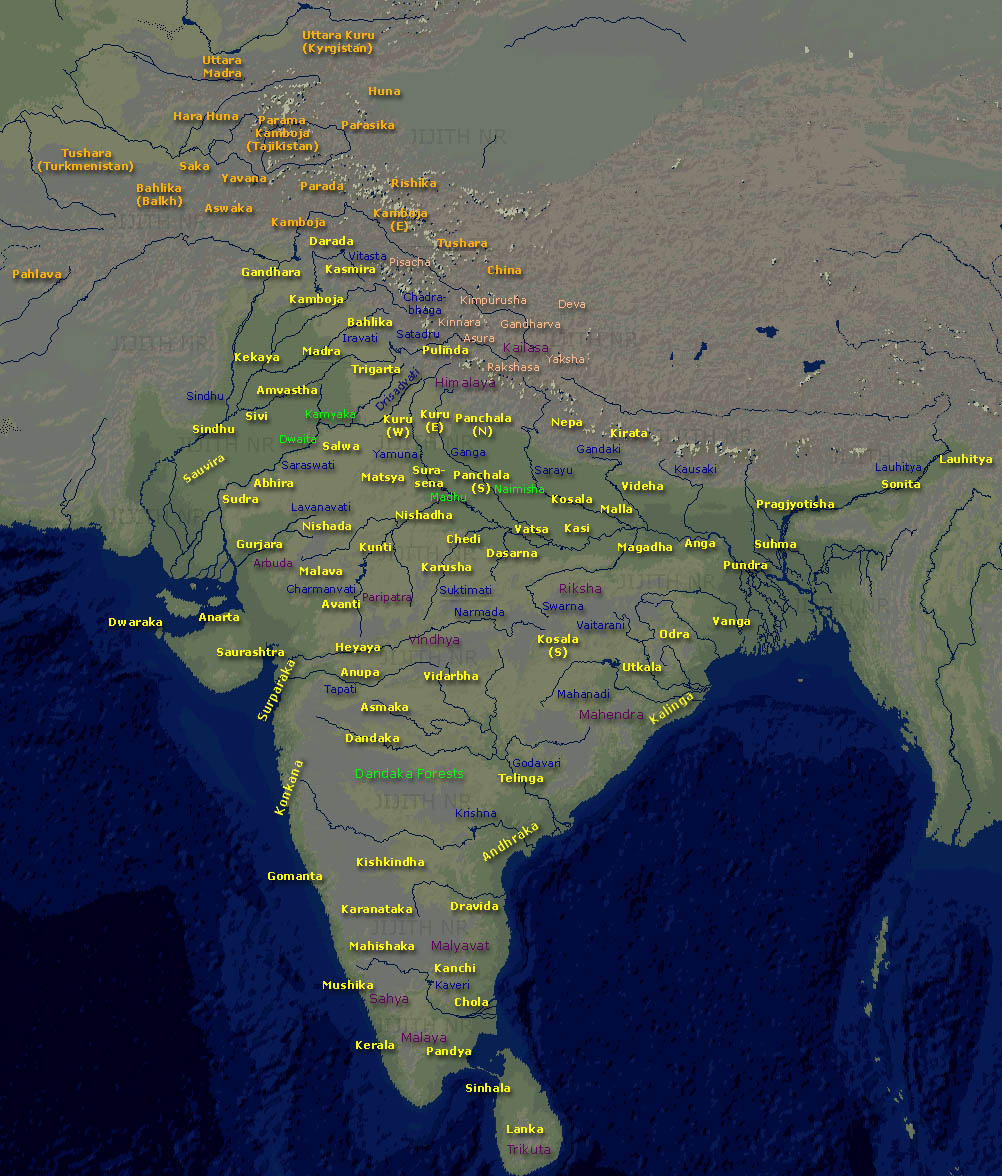Contenido - Contents
- Fotos de nityanandchandr
- Fotos de Marisha Naidoo del álbum radhe shyam
- Abhira
- ISKCON desire tree - Sri Krishna Kathamrita - Bindu 033
Fotos de Marisha Naidoo del álbum radhe shyam


nityanandchandr


Abhira
Abhira. A cowherd who, according to Manu, is the offspring of a Brahmin by a woman of the Ambashtha or medical tribe, and are a people located in the north of India along the Indus. There has been a good deal of misunderstanding about this people. Hindu writers have described them as living in the north and in the west, the location varying according to the locality of the writer, and translators have mixed them up with a neighboring people, the Shudras, sometimes called Shuras, with whom they are generally associated, and have called them Surabhiras. Their modern representatives are believed to be the Ahira and perhaps there is something more than identity of locality in their association with the Shudras. It has been suggested that the country or city of the Abhiras is the Ophir of the Bible. (The Manurishi Foundation, Encyclopedic Dictionary of Hindu Terms).
Abhira. Un vaquero que, según Manu, es el descendiente de un Brahmana con una mujer Ambashtha o de la tribu médica, y éste pueblo se encuentra situado en el norte de la India a lo largo del Indus. Ha habido muchos malentendidos sobre esta gente. Los escritores hindúes los han descrito como viviendo en el norte y en el oeste, la localización varia según el lugar del escritor, y los traductores los han mezclado aún más con una gente vecina, los Shudras, a veces llamado Shuras, con el cual son generalmente asociados, y la han llamado Surabhiras. Sus representantes modernos se creen ser el Ahira y quizás hay algo más que la identidad del lugar en su asociación con los Shudras. Se ha sugerido que el país o la ciudad del Abhiras es el Ophir de la biblia.
Abhira Kingdom
De Wikipedia, la enciclopedia libre
Sura and Abhira were mentioned as two kingdoms where the river
Sura y Abhira son mencionados como dos reinos en donde el río Saraswati existió solamente como un río seco durante la época de la guerra de Kurukshetra. Se refieren a veces como Surabhira también, combinando los reinos de Sura y de Abhira. Después de la caída de la federación de Dwaraka, cuando Arjuna llevaba a las mujeres de los Yadavas desde Dwaraka a Indraprastha, las tribus de Abhira lo atacaron y le robaron las mujeres y toda su riqueza.
See also
[edit] References
- Mahabharata of
Krishna Dwaipayana Vyasa, translated to English by Kisari Mohan Ganguli
ISKCON desire tree - Sri Krishna Kathamrita - Bindu 033

ISKCON desire tree
This ebook is compiled by ISKCON desire tree for the pleasure of Srila Prabhupada and the devotee vaishnava community. Media - ebooks derived from vedic or hindu teachings. For morevisit http://www.iskcondesiretree.com
ISKCON desire tree - Sri Krishna Kathamrita - Bindu 033
ISKCON desire tree published this 04 / 25 / 2009
ISKCON desire tree - Sri Krishna Kathamrita - Bindu 033
Fuentes - Fonts
SOUV2P.TTF - 57 KB
SOUV2I.TTF - 59 KB
babi____.ttf - 47 KB
bab_____.ttf - 45 KB
SOUV2T.TTF - 56 KB
inbenr11.ttf - 64 KB
inbeno11.ttf - 12 KB
inbeni11.ttf - 12 KB
inbenb11.ttf - 66 KB
balaram_.ttf - 45 KB
indevr20.ttf - 53 KB
Página PRINCIPAL
OBRAS y AUTORES CLÁSICOS
Agradecimientos
Cuadro General
Disculpen las Molestias
| Conceptos Hinduistas (1428)SC |
|---|
Category:Hindu (mythology) (3256)SC | Category:Hindu mythology (3270)SC | Categoría:Mitología hindú (3288)SC (indice) | Categoría:Mitología hindú (videos) (3289)SC | Conceptos Hinduista (A - G) SK y SC (videos) (3294)SC Aa-Anc · Aga - Ahy · Ai - Akshay · Akshe - Amshum · Ana - Ancie · Ang - Asvayu · Ata - Az · Baa-Baz · Be-Bhak · Bhal-Bu · C · Daa-Daz · De · Dha-Dry · Du-Dy · E · F · Gaa-Gayu · Ge-Gy · Ha-He · Hi-Hy · I · J · K · Ka - Kam · Kan - Khatu · Ki - Ko · Kr - Ku · L · M · N · O · P · R · S · Saa-San · Sap-Shy · Si-Sy · Ta - Te · U · V · Ve-Vy · Y · Z |
| Conceptos Hinduistas (2919)SK | (2592)SK |
|---|
Aa-Ag · Ah-Am · Ana-Anc · And-Anu · Ap-Ar · As-Ax · Ay-Az · Baa-Baq · Bar-Baz · Be-Bhak · Bhal-Bhy · Bo-Bu · Bra · Brh-Bry · Bu-Bz · Caa-Caq · Car-Cay · Ce-Cha · Che-Chi · Cho-Chu · Ci-Cn · Co-Cy · Daa-Dan · Dar-Day · De · Dha-Dny · Do-Dy · Ea-Eo · Ep-Ez · Faa-Fy · Gaa-Gaq · Gar-Gaz · Ge-Gn · Go · Gra-Gy · Haa-Haq · Har-Haz · He-Hindk · Hindu-Histo · Ho-Hy · Ia-Iq · Ir-Is · It-Iy · Jaa-Jaq · Jar-Jay · Je-Jn · Jo-Jy · Kaa-Kaq · Kar-Kaz · Ke-Kh · Ko · Kr · Ku - Kz · Laa-Laq · Lar-Lay · Le-Ln · Lo-Ly · Maa-Mag · Mah · Mai-Maj · Mak-Maq · Mar-Maz · Mb-Mn · Mo-Mz · Naa-Naq · Nar-Naz · Nb-Nn · No-Nz · Oa-Oz · Paa-Paq · Par-Paz · Pe-Ph · Po-Py · Raa-Raq · Rar-Raz · Re-Rn · Ro-Ry · Saa-Sam · San-Sar · Sas-Sg · Sha-Shy · Sia-Sil · Sim-Sn · So - Sq · Sr - St · Su-Sz · Taa-Taq · Tar-Tay · Te-Tn · To-Ty · Ua-Uq · Ur-Us · Vaa-Vaq · Var-Vaz · Ve · Vi-Vn · Vo-Vy · Waa-Wi · Wo-Wy · Yaa-Yav · Ye-Yiy · Yo-Yu · Zaa-Zy |














No hay comentarios:
Publicar un comentario